Another busy week in HE policy– with consultations and a very short timeline for the KEF. Everyone has hit the ground running in 2020!
The third leg of the HE stool arrives: KEF has landed
The outcome of the KEF consultation in 2019 has come out. UKRI have published the “Decisions for the first iteration”. They have given a very short timeline for the publication of the first set of data and narratives from institutions – they will all be published this summer. Narratives have to be submitted by May. Data will be published for everyone, whether they submit narratives or not.
They have also indicated that it is likely that from 2020/21 institutions will have to submit narratives for the KEF to be eligible for Research England funding.
- This first iteration of the KEF will take place in the current academic year 2019/20. All Higher Education Institutions (HEIs) eligible to receive Research England Higher Education Innovation Fund (HEIF) funding in this current academic year are in scope for this exercise.
- The KEF is taking a metrics-led approach, although it also includes a narrative component. As previously advised, all proposed KEF metrics use existing data sources that are already collected via existing statutory returns or other means. …. This reflects the minimal burden of this exercise as there is no need for any institution to gather or submit new metrics for this iteration of the KEF.
- The narrative component of the KEF will consist of three brief narrative statements … we intend to publish in summer 2020 the KEF metrics of all institutions in receipt of HEIF in this 2019/20 academic year. Therefore, institutions in receipt of HEIF in this academic year 2019/20 are strongly encouraged to submit narrative information to contextualise their results….
- This report will be followed by publication of the narrative templates and final cluster membership in February 2020. If institutions in scope for this exercise wish to have their narrative templates published alongside their results, the completed templates should be returned on Friday 15 May 2020.
- …Research England will provide further contextual information about the external environment in which the HEI operates that should be considered when interpreting results. This contextual information will be in the form a standard set of indicators at the LEP-region level.
- Results will be presented through an online visualisation platform displaying perspectives and underlying metrics, as well as narrative statements and contextual information
The metrics will be reported against “clusters”. They have changed their original cluster proposals somewhat, removing the Social Science and Business specialist cluster – final cluster membership will be published in February with the templates. These clusters have been designed to allow meaningful comparison. When BU responded to the consultation we suggested that it is unhelpful to introduce a third methodology for comparison – the TEF uses institutional benchmarks, something that has challenges itself, and the REF is of course organised by subject. We remain concerned that this will be confusing and not very meaningful for businesses and other organisations (the declared target for this information) who may not find the cluster comparison useful if they only have limited experience with a small number of universities.
You will recall that the metrics are grouped into seven “perspectives” – only two will require narratives. The consultation looked at additional metrics but has discounted any that are not already “gathered through existing statutory returns, or available from other UKRI or external sources”. This is because they want to make it a “low burden” exercise.
Public and Community Engagement narrative – a statement:
- identifying the public and community groups served by the institution and how their needs have been identified;
- description of the targeted activities that are undertaken to meet these needs;
- evidence that needs have been met and tangible outcomes achieved.
Local Growth and Regeneration narrative – a statement:
- identifying the geographical area(s) that the institution considers to be its local area;
- explanation of how needs of the local area(s) that relate to economic growth and regeneration are identified;
- description of the targeted activities undertaken by the institution to meet those needs and any outcomes achieved.
The third narrative will be an institutional context narrative – “setting out the geographic, economic and social context within which the higher education institution is operating…. The information contained within this statement will not be used to normalise any of the metrics or perspectives across clusters.”
David Kernohan has written for Wonkhe about it:
- “The Knowledge Exchange Framework is not (like REF and TEF are) an “excellence framework”. It doesn’t make any judgement on the quality of business and community interaction, just on the proportional volume and likely output of a number of activities described in the HE-BCI survey data. Neither is it of use to professional or armchair rankers – it doesn’t offer named awards or simple stepped gradations that demonstrate one thing is unfailingly better than another.
- It may eventually be used to support the allocation of the £200m Higher Education Innovation Fund (HEIF), which is currently allocated using similar data. But for the first year (2020-21) it is for entertainment and edification purposes only.”
David summarises the pages of normalisation methodology in the document nicely: “Metrics are a three-year average, mostly …as ratios, which are converted at perspective level into deciles. This reduces a great deal of data and analysis into what amounts to a set of marks out of 10, which are compared to an average mark from comparable institutions (the infamous clusters)”.
And the visualisation approach: “Research England has a grand plan to use spider graphs to show institutional scores alongside cluster averages, with an option to drill down into more detailed data on each metric. I’m not as struck by this as they are – the exercise is designed to support comparisons and spider diagrams are an unwieldy way to do this. I also feel like the individual metrics are still fairly abstract, you have to go quite a long way back down the methodology to get something that the mind can easily take hold of.”
Erasmus after Brexit
After the social media storm last week when Parliament didn’t approve the Erasmus amendment to the Withdrawal Agreement Bill (it doesn’t mean we can’t be in it, it just means that government won’t be bound by the new Bill to make sure we are in it), there have been a few questions this week.
Douglas Chapman (SNP) said that the end of Erasmus scheme was an “utter disaster, culturally and socially” and asked the PM to comment on the end of the participation of the scheme. Boris’ response implied that the UK would continue to participate in the scheme.
And there were several questions on Erasmus (see this one and this one) – all with similar response – that the Government is including it within the Brexit negotiations and is working towards remaining within the scheme. The House of Commons Library have released this briefing paper on Erasmus to inform MPs ahead of Monday’s scheduled Education debate.
New HESA data
HESA have published higher education statistics for 2018/19. Interestingly, the OfS focussed on grade inflation in their response –and nothing else.
Sex of students
- Of all HE students 57% were female in 2018/19 (see Figure 4), this has been the same since 2016/17.
- A larger proportion of part-time students were female than full-time students.
- For other undergraduate students, 64% were female, compared with 49% of postgraduate (research) students.
Age of students
- The overall number of first year students aged 30 and over has increased in 2018/19 after a decreasing trend in previous years.
- The number of first year students aged 21-24 has increased from 2015/16 to 2018/19.
- The number of first year full-time students aged 30 and over has increased every year since 2014/15.
- Numbers of full-time students aged 20 and under have increased year on year since 2012/13.
Student disability status
- The overall number of students with a known disability is increasing year on year. The main reason for this increase is students identified as having a mental health condition.
- Of students with a known disability in 2018/19 the category of specific learning difficulty is the largest group accounting for 36% of the total.
Ethnicity of students
- The percentage of UK domiciled students that are White has decreased over the last five years. However, the percentage that are Asian, Mixed and from Other ethnic backgrounds has increased.
- HE providers in England show the largest decrease and the lowest proportion of UK domiciled students that are White compared to HE providers in all other countries of the UK.
Within the European Union:
- Italy has seen a notable rise to become the top European Union country sending students to the UK, overtaking three other countries in the last five years.
- Germany is the top European Union country to send students to Wales and Scotland, and Ireland is top in sending students to Northern Ireland.
Outside the European Union:
- China sent more students to the UK than any other overseas country. In 2018/19, 35% of all non-EU students were from China. The number of students from China was also 34% higher in 2018/19 than in 2014/15, increasing from 89,540 to 120,385 in the five year span.
- Student numbers from India increased from 18,325 in 2014/15 to 26,685 in 2018/19.
- The other countries in the chart are more in line with European Union student numbers.
- Nigeria has seen a 41% decline in student numbers coming to the UK over the five year period, dropping behind the United States, Hong Kong and Malaysia.
- For more recent trends in international student visa applications and granted visas, refer toTable 1 of Immigration statistics published by the Home Office in November 2019. Please note that although on a similar theme, these statistics are not directly comparable. Home Office statistics cover further education as well as higher education, and immigration data provides an indication of the number of people who have an intention to enter the UK for study reasons, not whether, or when, an individual actually arrived in the UK, or what they did on arrival to the UK.
Of those gaining a classified first degree:
- The percentage of students achieving a first class honours remains stable at 28% for both 2017/18 and 2018/19. This follows an increase year on year since 2009/10 where 14% of students achieved this classification.
- A larger proportion of female students gained a first or upper second class honours than male students.
- Full-time students had a larger proportion of first or upper second class honours than part-time students.
Subjects
In 2018/19:
- More qualifications were awarded in business & administrative studies than any other subject area.
- Amongst part-time students, more qualifications were awarded in subjects allied to medicine than any other subject area.
Over the five year period 2014/15 – 2018/19:
- There has been an overall increase in the number of qualifications gained in biological sciences and social studies.
- There has been a decline in the number of qualifications gained in languages and education.
Mental Health
Student Minds has launched The Wellbeing Thesis, a website designed to support postgraduate research students to maintain their mental wellbeing.
Baroness Tyler of Enfield has presented a Bill in the House of Lords which would amend the Education Act 2002 and the Academies Act 2010 for schools to promote the mental health and wellbeing of their pupils. The Bill will proceed to a second reading at a future date.
And some Parliamentary questions:
Q – Conor McGinn: To ask the Secretary of State for Education, what steps his Department is taking to (a) reduce the level of social stigma in relation to mental health and (b) promote awareness of mental health issues among young people.
A – Nick Gibb:
- The Department is making teaching about mental health part of compulsory health education in all state-funded schools in England from September 2020. The statutory guidance sets out that pupils will be taught about the importance of good physical and mental health including the steps pupils can take to protect and support their own health and mental wellbeing. The content will also cover understanding emotions; identifying where someone is experiencing signs of poor mental health; simple self-care; and how and when to seek support.
- The Department is also working with the Anna Freud National Centre for Children and Families to pilot setting up peer support approaches in schools and colleges that allow young people to play an active part of creating a mentally healthy and supportive environment. The findings from the programme’s external evaluation will be shared nationally, to help more schools to develop or improve their own mental health peer support programmes.
- To support school staff, the Department has set up Expert Advisory Group on teacher and leader wellbeing which has a remit to advise the Department on what it can do to help schools and colleges promote good wellbeing, including tackling stigma around mental health.
Labour leadership
Monday was the closing date for Labour leadership candidates to secure the 22 nominations from MPs to run for party leader. Chris Lewis and Barry Gardiner did not secure the required amount. The following candidates will progress to the next round (number of nominations received noted in brackets):
- Keir Starmer (89)
- Rebecca Long Bailey (33)
- Lisa Nandy (31)
- Jess Phillips (23)
- Emily Thornberry (23)
Candidates for deputy leader:
- Angela Rayner (88)
- Ian Murray (34)
- Dawn Butler (29)
- Rosena Allin-Khan (23)
- Richard Burgon (22)
We explained the leadership contest process in detail in last week’s policy update. However, here is a quick recap: the next phase requires the candidates to seek nominations from Constituency Labour Parties and the Unions by 15th Jan – to carry on they need support of 5% of the constituency parties (the BBC said 30) OR 3 affiliate organisations, including 2 trade unions. The members’ ballot opens on 21st Feb and runs to 2nd April. Votes are redistributed if there is no clear winner. Results announced on 4th April
An interesting background briefing on the Labour leadership candidates prepared by Dods is available here. It is worth a read to get to know the candidates better.
Fees and funding
The House of Commons Library has a new briefing paper on the Augar Review (Post 18 Education and Funding Review). The paper considers the recommendations of the Augar Review and the (page 26) initial responses to it from major HE bodies. The Government is rumoured to have made the decision on how they will respond (which parts they will adopt) of the Augar Review and intend to release their response at a suitable point (soon-ish!). Most likely the briefing paper has been produced because Education Questions will take place in Parliament next Monday.
And some Parliamentary questions:
Q -Baroness Bennett Of Manor Castle: following the announcement that nursing bursaries are to be reintroduced, what plans [the Government] have to support nurses, midwifes and other healthcare professionals with any debt incurred before the reintroduction to support their study and training.
A -Baroness Blackwood Of North Oxford:
- We have committed to 50,000 more nurses in the National Health Service by 2025 and our new financial support package is crucial to delivering this.
- Eligible pre-registration students on nursing, midwifery and many allied health students’ courses at English universities from September 2020 will benefit from additional support of at least £5,000 of non-repayable funding, with up to £3,000 additional funding for some students, who choose to study in regions or specialisms struggling to recruit, or to help with childcare costs, which they will not have to pay back.
- The Government has no plans to introduce a scheme that will backdate the offer for students who completed courses in earlier years.
Q – Dr Matthew Offord (Hendon): To ask the Secretary of State for Education, what steps his Department has taken to introduce Sharia compliant student loans.
A – Chris Skidmore (Kingswood): The government remains committed to introducing an Alternative Student Finance product for tuition fee and maintenance loans. Details on implementation will follow the conclusion of the review of post-18 education and funding.
Select Committees
Parliamentary business has been laid to commence the election of the select committee chairs now the new Parliament has formed. We anticipate the chairs will be announced early in February. Below is a diagram stating which party will chair each select committee.
There are several committees where the previous chairman has vacated their position through losing their seat, or where the chairmanship has switched from Labour to Tory to reflect Parliament’s new arithmetic (the number of chairs for each party is proportionate to the size of the party in Parliament). These include the Treasury, health, transport and work and pensions committees.
There is a potential change on the horizon. In the past when a parliamentary session ends the chairmanship and membership of a select committee ceases – as it did when the 2019 general election was called. However, a parliamentary motion introduced this week seeks to remove the limit on the maximum length of time an individual can chair a committee. This would allow parliamentarians to become long-serving chairs. There is also a clause which stipulates that the Brexit committee will continue for another year, even though the department it shadows — DExEU — is being wound up at the end of January.
Education Debate
There was a major Education and Local Government debate within the House of Commons this week led by Gavin Williamson, Secretary of State for Education. On schools the debate covered content on: the minimum school funding (per pupil), rolling out free schools (Midlands, North and South West), extra funding to Councils to support children in care, capital funding for childcare provision within schools (for school aged children), an arts activities premium for secondary schools from 2021, school building safety – following advice in the independent Hackitt review,
Gavin Williamson also said:
- The Government’s £3bn national skills fund would build on ongoing work to develop a national retraining scheme in underpinning economic prosperity.
- Capital investment of £1.8bn into the further education estate.
- The Government plans to create more mayors across England to devolve power away from Westminster via a devolution white paper.
Angela Rayner challenged the Government on the lack of response to the Augar review, particularly in relation to decision on the regulation of home education. She said: “While we are on the subject of Bills that are missing in action…The Augar review went from being a flagship to a ghost ship”.
SNP Shadow Secretary of State for Education, Carol Monaghan, asked the Minister whether a fee change would be forthcoming, further to the Augar review recommendations. She also raised concerns over the implications of Brexit on HE staff, research funding, infrastructure and collaboration: “A recent report from the Royal Society has shown that the UK’s share of EU funding has fallen by €500 million since 2015. There has also been a drop of 40% in UK applications to Horizon 2020. We are still in it just now, but we have had that drop because people do not have any certainty. The UK is now seen as a less attractive place to come and do research, with 35% fewer scientists coming to the UK through key schemes. That is of concern, as is Erasmus and what Brexit will mean for that programme”.
David Davis (Conservative) criticised the university tuition fees and loans scheme for delivering poor-quality education, high levels of expectations and low levels of outcome. He called for concerted action to tackle low productivity, including translational research, but also, “investment, education, infrastructure, magnet cities and garden villages”.
Previous chair of the Education Select Committee Robert Halfon welcomes the Queen’s Speech and said that he believes that “skills, social justice, standards and support for the profession should be the four interlocking foundations of this Government’s education programme.” He called on the Government to turbocharge adult learning, citing that adult learning is at its lowest since 1996 and that this county needs a world-class apprenticeships programme.
Halfon also raised concerns about disadvantaged pupils who are often 19 months behind by the time they reach their GCSEs, he called on the Government to have a “bold, assertive agenda that has compassion and aspiration right at its core.” Halfon told the chamber that the Government should offer top-quality childcare, to help plug the gap of disadvantaged children who are already left behind when they start primary school.
Shadow Minister for Northern Ireland Karin Smyth told the house that the Government has got it wrong in its implementation of apprenticeships, particularly by making the process more complicated for small and medium sized enterprises.
Janet Daby (Labour, Lewisham East) raised a number of concerns surrounding the funding of schools and local authorities. She told the house that “in the midst of a mental health crisis in young adults, we must do more to address the increasing lack of support in further education colleges.”
Steve McCabe (Labour, Birmingham, Selly Oak) welcomed the Secretary of State’s admission of the problems faced by pupils with special educational needs and disabilities. He also hoped that the new student visa would make it easier for people to come here to study, but noted that PhD students did not find it particularly easy to stay after they completed their doctorates.
Alex Norris (Labour/Co-op, Nottingham North) spoke about the educational trouble faced by working class boys, saying that it was caused by a cocktail of poor discipline, irregular attendance and below par curriculums. He called on the Government to have better curriculums based on international best practice; specific, targeted resource to augment the pupil premium; a focus on catching up for boys who fall behind at key stage 1; and the deployment of the best teachers in the most challenged schools, incentivised to work in the hard environments.
Bambos Charalambous (Labour) said there wasn’t enough school funding to reverse cuts on areas like school maintenance and a lack of further education.
You can read the debate in full here.
Skills gap
The Local Government Association (LGA) published a report (compiled by the Learning and Work Institute) considering 2030 projected skills gaps in England. It considers eight areas and quantifies potential loss of economic output due to the skills gaps. They conclude that 6 million people in England risk being without a job or in work they are over-qualified for by 2030. This is a similar message to the Government’s line on upskilling the workforce to plug business needs due to insufficient skills within the workforce. However, the LGA imagine a more localised solution to the skills gaps. Key points:
- 1 million low-skilled people chasing 2 million low-skilled jobs – a surplus of 3.1 million low-skilled workers
- 7 million people with intermediate skills chasing 9.5 million jobs – a surplus of 3.1 million people
- 4 million high-skilled jobs with only 14.8 million high-skilled workers – a deficit of 2.5 million
This note looks at the extent and nature of the potential skills gap that could be faced in the future through to 2030 – at both the level of England as a whole and in eight selected local areas:
- Nottingham City
- Staffordshire
- Gloucestershire
- Greater Lincolnshire
- Essex, Southend and Thurrock
- Lambeth, Lewisham and Southwark
- North of Tyne
- Southampton and Portsmouth
The LGA are critical of the current centrally-governed skills and employment system whereby £10.5 billion a year is spent by eight government departments and agencies across 20 different national schemes. Unsurprisingly the LGA is calling for the Government to use the Budget to devolve all back-to-work, skills, apprenticeship, careers advice, and business support schemes and funding to the local areas in which they are used. They envisage groups of councils across England with the power and funding to deliver a one-stop ‘Work Local’ service for skills, apprenticeship, employment, careers advice and business support provision. Bringing together local skills planning, overseeing job support including Jobcentre Plus and the Work and Health Programme and coordinate careers advice and guidance for young people and adults.
Cllr Kevin Bentley, Chairman of the LGA’s People and Places Board, said:
- Millions of people face a future where they have skills mismatched for jobs at a huge cost to people’s lives and the local and national economy. Councils are ideally placed to lead efforts to help the Government bring growth and jobs to all parts of the country and ensure everyone is fully equipped with the skills they need to compete for future jobs.
Stephen Evans, Chief Executive of Learning and Work Institute, said:
- Improving skills is central to making the 2020s a decade of growth. Other countries have continued to invest in skills, while progress in England has stalled over the last decade, the result of large cuts in England’s adult education budget which has left us lagging behind other countries and the number of adults improving their skills at a record low. We now need a decade of investment, in order to boost life chances,
Widening participation
A thought provoking HEPI blog considers the last 20 years of research published on addressing widening participation (WP) aims. It covers all the expected current topics from the BME attainment gap to the non-participation in HE by costal and/or rural areas. It highlights international approaches such as that from Australia and Canada explaining how studies addressed the same enduring gaps as the UK has now. Overall there are no magic solutions but the blog is reinvigorating in the way it brings all the WP themes together for fresh reconsideration. You can read the full blog here.
At Prime Minister’s Questions this week previous Head of the Education Select Committee, Robert Halfon said that despite improvement in educational standards and funding, white working-class boys underperform at every stage of education system. He questioned whether, in the context of large infrastructure projects expected, and the high value apprenticeships associated, whether the apprenticeship levy could be reformed to enable such young people to climb the skills ladder of opportunity. Boris responded that the House should follow Halfon’s advice and reform the apprenticeship levy, and intimated that the Education Secretary would update the House on this in due course.
And some Parliamentary questions:
Q – Lord Bourne Of Aberystwyth: To ask Her Majesty’s Government what progress they have made in improving education outcomes for Gypsy, Roma, and Traveller communities.
A – Lord Agnew Of Oulton:
- The latest published data, including breakdowns for Gypsy, Roma and Traveller (GRT) pupils, relates to 2019 at key stage 2 and 2018 at key stage 4. At both stages, the data showed a small improvement in headline attainment measures for this group compared to the previous year. At key stage 2, the percentage of GRT pupils attaining the expected standard in reading, writing and mathematics rose from 19% in 2018 to 20% in 2019. At key stage 4, the percentage achieving grades 9-4 in English and mathematics rose from 11.8% in 2017 to 13.1% in 2018.
- The government is taking significant steps forward to support attainment and progression for all pupils, including GRT pupils. Our education reforms, including those aimed at improving teaching; encouraging good attendance and behaviour; and strengthening the curriculum and examination system, are designed to improve opportunity and standards for all pupils. These reforms are underpinned by school accountability measures, which are intended to encourage schools to focus more closely on the attainment of all their pupils.
- Through the pupil premium; we are addressing low economic circumstances. This is a key factor that predicts future educational outcomes, and affects a high proportion of GRT children. Since 2011, we have provided over £15 billion of this additional funding, with a further £2.4 billion being distributed in this financial year.
Life Sciences
Medical Science is one of BU’s strategic investment areas (SIA). Colleagues with an interest in this SIA area will be interested in the Life Sciences Industrial Strategy update which highlights progress in delivering the strategy since 2017. It covers:
- NHS collaboration
- Business environment
- Reinforcing the UK science offer, including clinical research, data and genomics
- Skills
- Advanced therapies, including developing advanced therapies and advanced therapies manufacturing
The report notes very substantial progress in making the UK a more attractive place for life sciences companies to succeed and grow. These developments are the result of a strong collaboration between all aspects of this diverse industry – pharma, biotech, medtech, digital and diagnostics – the wider research community in the UK, the NHS and government. And states A substantial majority of the objectives in the Life Sciences Industrial Strategy have been met and more are being delivered now. Page 5 details the key achievements and page 10 onwards details the health and clinical research and development. Page 20 covers growing the skills base and workforce to deliver the life sciences industrial strategy. However, the content is limited and mainly covers AI and existing initiatives. It does not that the 2030 Skills Strategy will be published this year so we can expect more detail in the new future facing document. Page 21 briefly touches on commercialisation of university research. You can read the sections that interest you most here.
Other news
Unconditional offers: Nottingham Trent have followed their public discussion on grade inflation last year by collaborating with The Times and publishing detail of their defence on conditional unconditional offers. Wonkhe had an article by Mike Ratcliffe, their Academic Registrar.
Care Students: The Scottish Funding Council has published its National Ambition for Care-Experienced Students, which outlines its commitment to equal outcomes for those students by 2030.
Languages: The Financial Times responds to the HEPI language report, arguing that foreign language study should be made compulsory.
Social Commuting: The Guardian have a short, to the point, piece advising commuter students how to balance a social life with their commuting arrangements.
R&D – extending definition to cover the Creative Industries: Last week there was an interesting mini-debate following this question by Baroness Bull: To ask Her Majesty’s Government what consideration they have given to adopting a broader definition of research and development that includes, and incentivises, research and development investment in the creative industries. You can read the debate responses and follow on questions here.
Universities and Crime – a Parliamentary question
Q – Lord Taylor Of Warwick: To ask Her Majesty’s Government what discussions they have had with UK Universities about reports that universities are not reporting crime statistics.
A – Baroness Berridge:
- Criminal acts and misconduct are unacceptable in our world-leading universities, which should be safe and inclusive environments. Universities are autonomous institutions, and it is for each provider to determine what information should be collected and reported. Institutions have no statutory requirement to report crime statistics but have a responsibility to ensure students feel safe and able to report incidents, and to provide robust policies and procedures to address all forms of misconduct.
- Current recorded crime statistics cover incidents reported to police. Where an institution (or the victim themselves) report the matter to the police it will be recorded and therefore captured in crime statistics. The government is aware that third party organisations collate data relating to incidents reported as taking place in Higher Education Providers (HEPs) and officials monitor this information.
- The government expects providers to keep records of incidents disclosed to them and act swiftly to investigate and address them, with police involvement where necessary. Effective data collection processes enable HEPs to review and analyse reported incidents and complaints to inform continuous improvement. HEPs should continue to break down barriers to reporting, to ensure students and staff feel safe and able to report incidents.
- The government continues to work closely with Universities UK (UUK) on implementing its Changing the Culture framework. The most recent progress report, published in October 2019, showed that 72% of responding institutions had developed or improved recording of data on incidents with a more centralised approach. UUK are also supporting HEPs in handling misconduct and criminal offences, including working with the Police Association of Higher Education Liaison Officers to explore how to best support information sharing between police forces and universities, and government officials meet regularly with UUK representatives.
Subscribe!
To subscribe to the weekly policy update simply email policy@bournemouth.ac.uk
JANE FORSTER | SARAH CARTER
Policy Advisor Policy & Public Affairs Officer
Follow: @PolicyBU on Twitter | policy@bournemouth.ac.uk
 nowledge exchange activity demonstrated that over the past three years BU’s RKE income met c. 80% of the full economic costs (fEC) of the projects. The review also looked at the fEC thresholds and found they were out of date and unrealistic, for example, a number of the thresholds did not match the funding models provided by funders.
nowledge exchange activity demonstrated that over the past three years BU’s RKE income met c. 80% of the full economic costs (fEC) of the projects. The review also looked at the fEC thresholds and found they were out of date and unrealistic, for example, a number of the thresholds did not match the funding models provided by funders. A video recording of the roundtable on Public Diplomacy and “what is next after COVID-19” is now available
A video recording of the roundtable on Public Diplomacy and “what is next after COVID-19” is now available  atures that she co-ordinated as a volunteer. The Group has grown fast to over 100 members worldwide and brings together scholars investigating topics related to public diplomacy, nation branding, country image and reputation, public relations for and of nations, as well as political, global and cultural communication influencing international relations. She organized the 2018 doctoral and postdoctoral Public Diplomacy preconference in Prague and the 2019 Washington “Public Diplomacy in the 2020s”, including a panel hosted by the US Department of State.
atures that she co-ordinated as a volunteer. The Group has grown fast to over 100 members worldwide and brings together scholars investigating topics related to public diplomacy, nation branding, country image and reputation, public relations for and of nations, as well as political, global and cultural communication influencing international relations. She organized the 2018 doctoral and postdoctoral Public Diplomacy preconference in Prague and the 2019 Washington “Public Diplomacy in the 2020s”, including a panel hosted by the US Department of State.
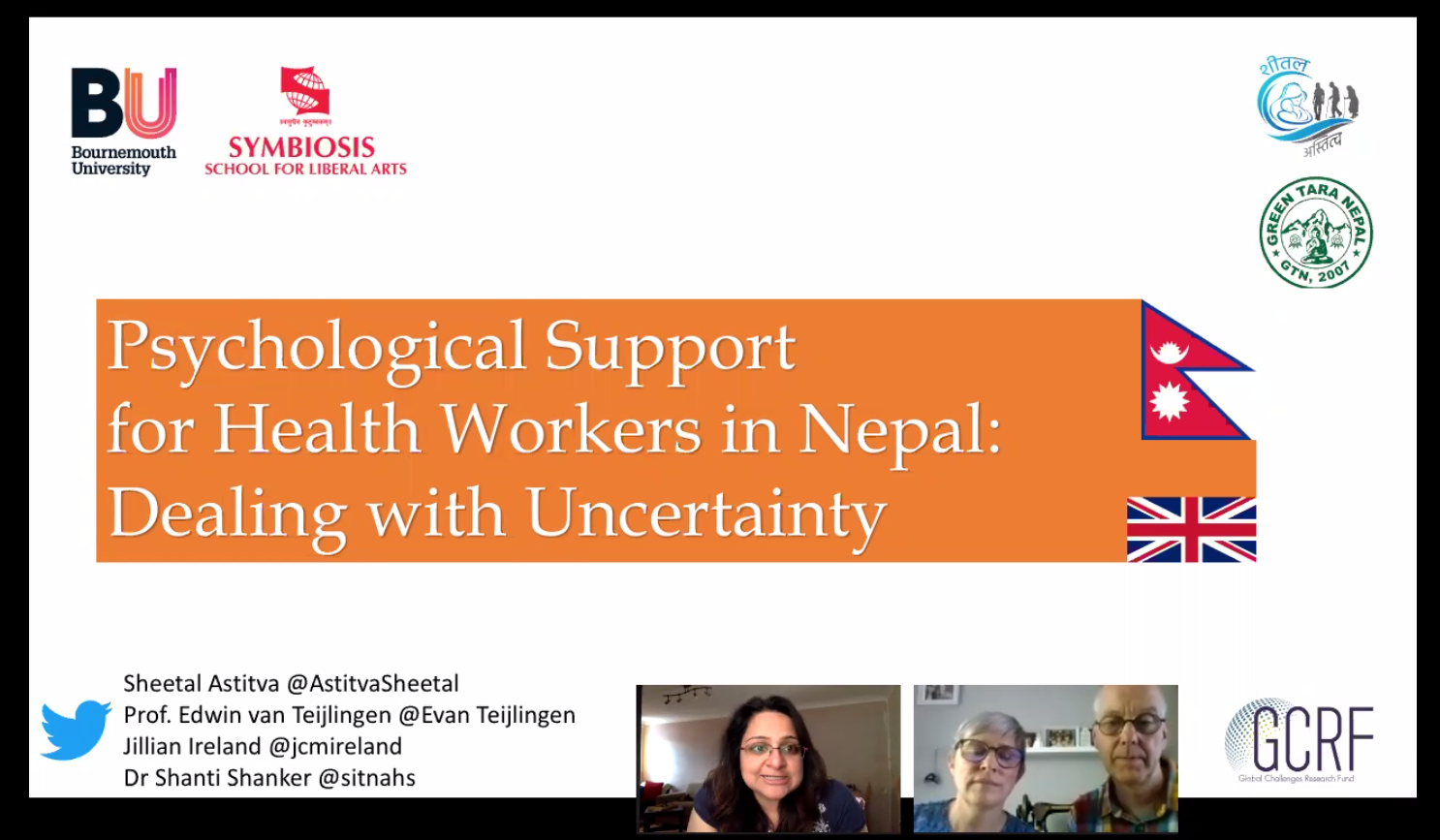
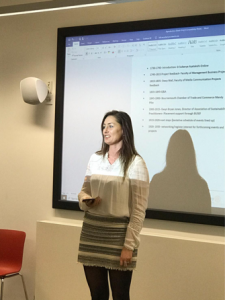

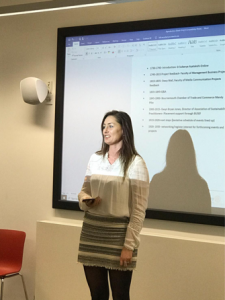
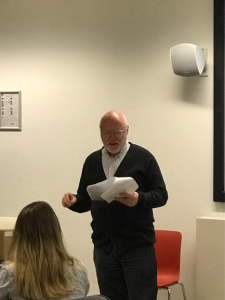
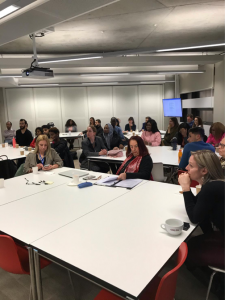
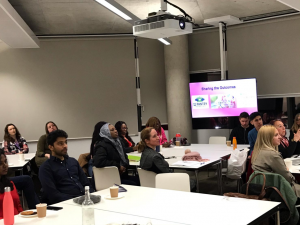
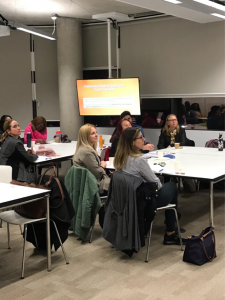

















 EMA held its 6th triennial education conference in Malmo, Sweden from the 28-29 November 2019. Dr. Luisa Cescutti-Butler and Professor Sue Way had three abstracts accepted, two of which highlighted units of learning in our midwifery undergraduate programme (Evaluating the student experience of introducing newborn infant physical theory into a pre-registration midwifery programme in the UK and An evaluation of the student experience of peer facilitated learning) and a further one which was focused on a national collaborative project on grading practice (Developing a set of key principles to achieve consistency in assessing pre-registration midwifery competency in practice in the UK). The opening keynote speaker at the EMA Conference was Fran McConville – Midwifery Expert at WHO. Fran presented on ‘Strengthening Quality Midwifery Education for Universal Health Coverage 2030’. Our takeaway message from her presentation was the following important statement: “When midwives are educated to international standards, and midwifery includes the provision of family planning……more than 80% of all maternal deaths, stillbirths and neonatal deaths could be averted”.
EMA held its 6th triennial education conference in Malmo, Sweden from the 28-29 November 2019. Dr. Luisa Cescutti-Butler and Professor Sue Way had three abstracts accepted, two of which highlighted units of learning in our midwifery undergraduate programme (Evaluating the student experience of introducing newborn infant physical theory into a pre-registration midwifery programme in the UK and An evaluation of the student experience of peer facilitated learning) and a further one which was focused on a national collaborative project on grading practice (Developing a set of key principles to achieve consistency in assessing pre-registration midwifery competency in practice in the UK). The opening keynote speaker at the EMA Conference was Fran McConville – Midwifery Expert at WHO. Fran presented on ‘Strengthening Quality Midwifery Education for Universal Health Coverage 2030’. Our takeaway message from her presentation was the following important statement: “When midwives are educated to international standards, and midwifery includes the provision of family planning……more than 80% of all maternal deaths, stillbirths and neonatal deaths could be averted”.


 A balanced diet is essential for good health. In 2003, the World Health Organisation launched a global campaign to promote fruit and vegetable consumption well-known as the five-a-day mantra. Despite the clear health benefits and prominent media campaigns, still only one in ten children, and less than a third of adults consume this much.
A balanced diet is essential for good health. In 2003, the World Health Organisation launched a global campaign to promote fruit and vegetable consumption well-known as the five-a-day mantra. Despite the clear health benefits and prominent media campaigns, still only one in ten children, and less than a third of adults consume this much.
 With the aid of QR funding (Faculty of Management), I conducted field-research in Ubud, Indonesia in July 2019. I went into the field with two research questions, linked to poverty alleviation and sustainable community development. What is the impact of spiritual/wellness tourism on local people and communities in Ubud? What are the strategies that can help provide micro-entrepreneurship opportunities for the poor? I interviewed multiple stakeholders including a former Indonesian Minister of Tourism, a spiritual leader in Ubud, a representative of the Ubud home stay association, local yoga teachers and other private/public stakeholders. I also talked to a representative of a rural orphanage.
With the aid of QR funding (Faculty of Management), I conducted field-research in Ubud, Indonesia in July 2019. I went into the field with two research questions, linked to poverty alleviation and sustainable community development. What is the impact of spiritual/wellness tourism on local people and communities in Ubud? What are the strategies that can help provide micro-entrepreneurship opportunities for the poor? I interviewed multiple stakeholders including a former Indonesian Minister of Tourism, a spiritual leader in Ubud, a representative of the Ubud home stay association, local yoga teachers and other private/public stakeholders. I also talked to a representative of a rural orphanage.
















 Second NIHR MIHERC meeting in Bournemouth this week
Second NIHR MIHERC meeting in Bournemouth this week Dr. Ashraf cited on ‘Modest Fashion’ in The Guardian
Dr. Ashraf cited on ‘Modest Fashion’ in The Guardian NIHR-funded research launches website
NIHR-funded research launches website MSCA Postdoctoral Fellowships 2025 Call
MSCA Postdoctoral Fellowships 2025 Call ERC Advanced Grant 2025 Webinar
ERC Advanced Grant 2025 Webinar Horizon Europe Work Programme 2025 Published
Horizon Europe Work Programme 2025 Published Horizon Europe 2025 Work Programme pre-Published
Horizon Europe 2025 Work Programme pre-Published Update on UKRO services
Update on UKRO services European research project exploring use of ‘virtual twins’ to better manage metabolic associated fatty liver disease
European research project exploring use of ‘virtual twins’ to better manage metabolic associated fatty liver disease